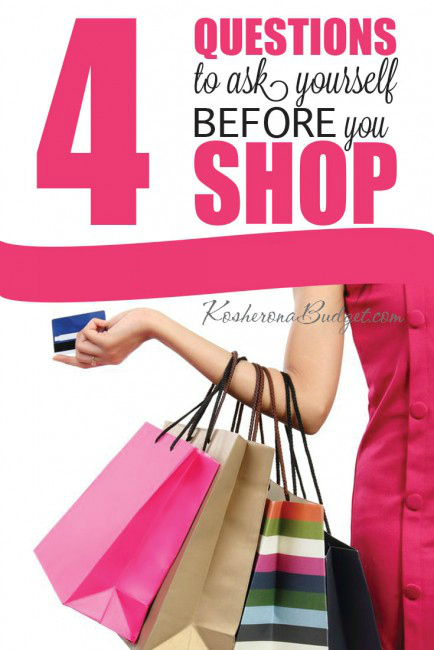 Finding awesome deals is a big part of what I do here at KOAB.
Finding awesome deals is a big part of what I do here at KOAB.
And I absolutely love helping you to save money on everything from clean supplies and clothing to groceries and gifts.
But I’d be remiss if I didn’t also acknowledge that I have heard from some of you that sometimes the temptation to impulse shop is just too great when these deals pop up.
Maybe it doesn’t happen when you’re reading Kosher on a Budget, but rather when you’re shopping at Target — and somehow end up with a $100 bill no matter how few items were on your list!
(Anyone? I know it can’t be just me!)
If so, let’s try get to the root cause of the phenomenon: Why do we buy things when we can’t really afford them?
Let’s face it: Those dopamine-receptors in our brain light up like crazy when we spend money — and all the more so if we are scoring a deal. It feels good to buy things.
Paradoxically, however, spending money we don’t have (or which we have, but has been budgeted for other purposes) is actually self-destructive behavior.
Which is why I’m writing this post. I want to give you a quick tool you can use to stop that self destructive behavior in its tracks.
Because here’s the truth: No matter how great the deal is, it’s never a bargain if you can’t really afford it.
(Learned that lesson the hard way. Many, many times.)
So when you’re not sure if a deal is right for you, ask yourself these four questions!
#1. Was I planning to purchase this item anyway?
Impulse purchases aren’t necessarily wrong. You may not have been planning to buy something, but when you see it, you remember — oh yeah, we’re out of X, and this is a great price, so I’d better pick it up. But impulse shopping can also be a red flag to something else going on — and it’s a good thing to be in touch with that BEFORE the credit card comes out.
#2. Do I have the money in my budget to pay for it?
Whether a purchase was planned or not (#1), you should still make sure you have the money to pay for it. And not just that the money is in your bank account, but that it’s BUDGETED for this purpose.
Just because you have $2000 in your checking account, doesn’t mean you have $2000 to spend on great deals. That two grand may have already been budgeted for other purposes (in fact, it probably was) – like your mortgage, gas and groceries.
#3. Can I make do or do without?
Even if there’s a real need, that doesn’t mean that you have to make a purchase right now to fill that need. Sometimes you can make do with what you already have, or even do without for a while — especially when money is tight.
For example, can you put off buying a new pair of shoes until the spring? Does the window have been fixed right now? (Of course, if not fixing it immediately will cause more expensive damage down the road, you don’t want to put it off!)
#4. If I decide to make the purchase, am I getting the very best price I can?
This is where Kosher on a Budget comes in. I find all these great deals, so you don’t have to waste your time looking for them. But here’s the truth about just about every single deal I’ve ever posted: There will always be another one.
So if the money isn’t there right now, it’s okay to wait. Because when the money IS there, you’ll still be able to find a deal. And the purchase will be blessing rather than a curse.
***
By the way, in case you’re wondering, I don’t ask myself these questions with every purchase. If I’m out picking up a gallon of milk or a pound of ground beef, I just assume it’s a need, that I can’t make do or do without — and yes, the money has been budgeted. If/when I feel an impulse purchase coming on, however, these four questions have been keeping me honest for years!
I’d love to know how you balance scoring great deals with being a savvy budgeter!















Leave a Comment